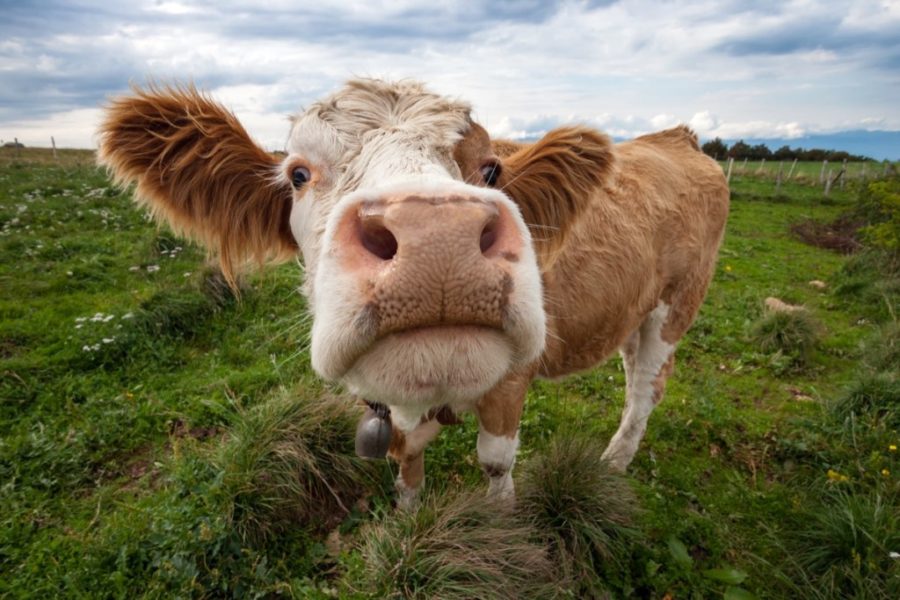From Pasture to Plate
We typically don’t think twice about how the food we put on our plates directly affects the world around us. The meat industrial complex is a perfect example of how one’s decisions can have a large impact. This is because it engages in unethical practices through living conditions for livestock and environmental impact.
Livestock’s living conditions have typically been at the forefront of the meat industry debate. This is due to many factory farms having overcrowded pens and cages and providing unsanitary living spaces.
Lately, environmental impact has started to rise as a concern for the meat industry. Dr. Francis Vergunst, a University of Montreal Public Health Fellow, states, “[The meat industry] contributes to land and water degradation, biodiversity loss, acid rain, coral reef degeneration and deforestation” (The Conversation).
With moral and environmental factors at play, questions like ‘Should one change to a plant-based diet based on the meat industry practices?’ and ‘If one is unable to cut it out of their diet, how can they ethically continue to eat meat?’ are raised.
The Pros Of Eating Meat
The meat industrial complex allows society to have simplicity in their diet in terms of cost, convenience, and nutrients.
The cost of eating a meat-based diet over a plant-based diet is the strongest factor as to why people continue to eat meat. Plant-based diets involve buying food options that are often more expensive than their meat-based counterparts while also having a shorter shelf life.
As a lifetime meat-eater, Jay Tyler values the accessibility for people across varying social classes to food that is both fulfilling and affordable. He says, “It’s more economically sustainable for the average person to be able to buy a bag of chicken nuggets to sit in the freezer when compared to vegetables that go bad in under two weeks.”
As a staple to many diets, meat allows people to achieve nutritional fulfillment for things such as iron and protein. Such levels of said nutrients are difficult to find in plant-based diets.
With how extensive the meat industry is, it allows for widely made access for different meats, and with that, an unfathomable array of food choices to choose from. Convenience in diet makes it easier to engage with everyday activities such as grocery shopping and going out to eat.
The Cons of Eating Meat
While having a meat-based diet is simpler, plant-based diets have shown to exhibit their strengths in other areas.
Plant-based diets don’t prevent someone from obtaining specific nutrients but make them find nutrients beyond animal products. Someone on a plant-based diet can still get protein through foods like seeds and leafy greens or even pill supplements.
Convenience in a diet is slowly becoming less prevalent in the meat industry argument. In recent years the number of people who have switched over to vegetarianism or veganism has surged. With this new group of customers, companies such as Burger King and Taco Bell have put in the effort to establish plant-based food items.
Vegan Victoria Meyers says, “After the initial switch, the hardest part of being vegan is the inconvenience. You just have to view it on a learning curve on what’s available to you and that you like. There are delicious options out there beyond just salads.”
Admittedly, the cost of being on a plant-based diet can be much higher than a meat-based one.
Many people don’t have the extra resources to partake in any other lifestyle than the one they currently have set up for themselves. When someone is on a budget and needs to provide for themselves or their family, it is more logical to buy hamburgers from McDonald’s than ingredients to make a salad.
So, What Should You Do?
The best way to not condone the meat industrial complex’s practices is by cutting out meat altogether. If you don’t provide money to continue to fund unethical practices, there is no way for these conditions to be upheld.
However, it is unrealistic to expect everyone to take on a plant-based lifestyle. A simple action that can go a long way is becoming proactive in the meat you do end up buying.
Whenever available, it can be especially helpful to buy meat where the animals were free range to avoid factory farms’ inhumane living conditions. Typically, ethical practice-based meat companies will have certification stickers on the package to show their humane treatment of animals.
Three common certifications to look for are Animal Welfare Approved, Global Animal Partnership, and Certified Human. Through quick research, you can find extensive lists of what brands fall under these categories.
When taking these steps, we can help promote a better world around us through diets with ethical business practices, such as humane treatment of animals and more environmentally beneficial pathways.

Morgan Raper is a sophomore at Delta State University from Cleveland, Mississippi. She will graduate with a BA in English Education in May of 2023. After...



